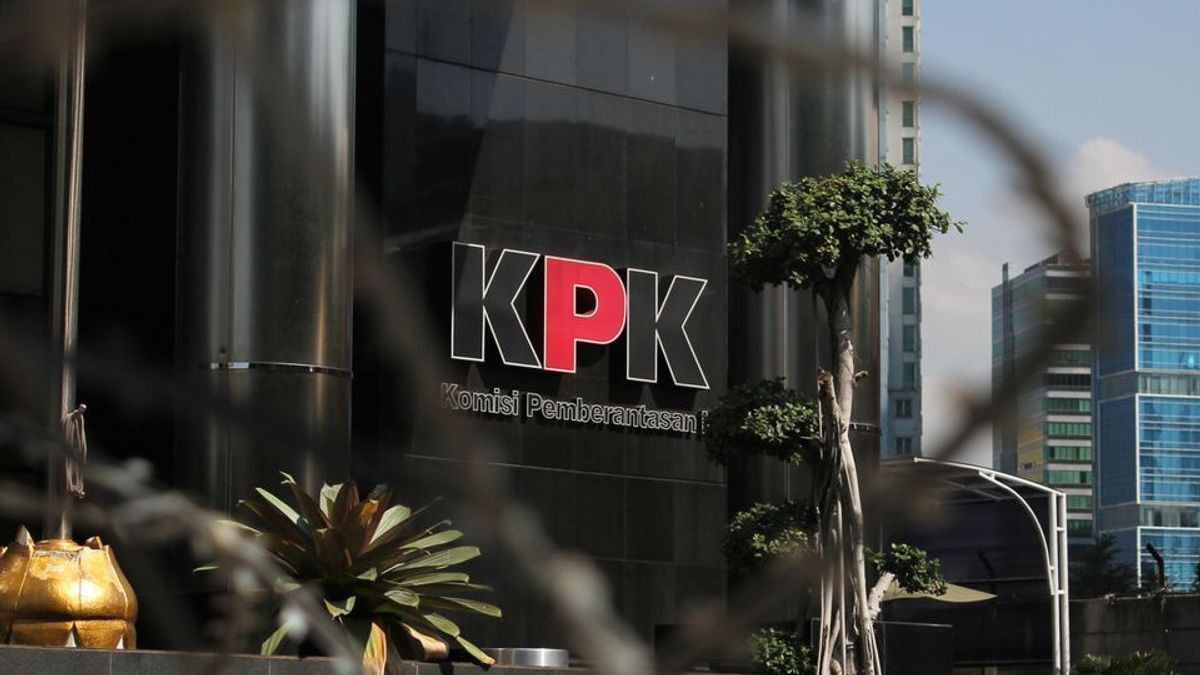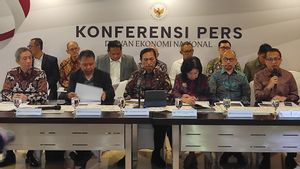JAKARTA - Filling Indonesia's independence is actually more difficult than fighting for it from the invaders. The enemies of the state that are currently facing are humans who are mentally colonized by corrupt behavior. They are the ones who are the culprits of hampering the progress of the nation and state, through the crime of corruption.
Corruption is a crime against humanity, not only harming the state's finances, but also depriving the people of their rights. Many countries fail to realize their goals because of corruption crimes. So, no exaggeration, true independence is when the nation and state are truly clean and free from all forms of corruption.
Chairman of the Corruption Eradication Commission (KPK) Firli Bahuri conveyed this through a press release on the momentum of the 77th Independence Day of Indonesia, Wednesday (17/8).
"It's time for all of the nation's children to play a role in stopping corruption and take up sharp bamboo weapons which are none other than integrity, honesty values wrapped in moral strength, high morals to fight and eradicate corruption," said Firli.
During the last seven years, for the period 2004-2021, the KPK said it had handled 1,194 corruption cases. The most cases were bribery as many as 775 cases. Then there are 226 cases of procurement of goods or services, 50 cases of budget abuse, and 41 cases of money laundering.

Then, levies or extortion 26 cases, licensing 25 cases, and hindering the investigation of 11 cases.
The majority of corruption crimes were committed in district/city government agencies with 455 cases, ministry/institutional agencies 395 cases, and provincial government 158 cases.
According to Firli, the government has never played around with efforts to eradicate corruption.
"I strongly agree with the speech of the President and for that, the KPK is determined to continuously strengthen the synergy with the Police and the Attorney General's Office in terms of eradicating corruption, which is a priority issue for the nation that must be addressed quickly," added Firli.
"The law must be enforced indiscriminately in line with the non-negotiable upholding of democratic values," Firli added.
Legal WeakeningInstead of enforcing the law and promoting an effective deterrent effect for perpetrators of corruption through the Draft Criminal Code (RKUHP), the government has weakened it even more. Indonesia Corruption Watch (ICW) assesses that there are several points in the RKUHP draft 4 July 2022 which actually weaken efforts to eradicate corruption in the country.
The first point is related to the reduction of punishment for corruption perpetrators. Article 607 of the RKUHP, which is a new form of Article 2 paragraph (1) of the Anti-Corruption Law, turns out to contain a reduction in corporal punishment from 4 years to 2 years in prison. The minimum fine has also decreased from IDR 200 million to only IDR 10 million.
Then Article 608 of the RKUHP which is a new form of Article 3 of the Anti-Corruption Law. Even though the corporal punishment has increased from 1 year to 2 years in prison, it is not comparable to the legal subject of the perpetrator, namely public officials.
"This is at the same time an effort to equalize punishment between the community and someone who has a certain public position," said ICW researcher Kurnia Ramadhana in a written statement, Thursday (18/8).
Then, Article 610 paragraph (2) of the RKUHP which is a new form of Article 11 of the Anti-Corruption Law. Similar to other provisions, the punishment for bribe recipients has also decreased, from 5 years to 4 years in prison. Other basic penalties, such as fines, have also decreased from Rp250 million to Rp200 million.

Specifically regarding the penalty of fines, it is important to convey that one of the main crimes is still relatively low in the RKUHP text. How not, the maximum fine that can be imposed on the perpetrators is only IDR 2 billion.
“This is very different from other special criminal acts, such as the Narcotics Law or the Anti-Money Laundering Law, which can be fined up to IDR 10 billion. Based on the background of corruption as an economic crime, fines should be increased," Kurnia continued.
The second point related to the explanation of Article 607 of the RKUHP which is meant by harming state finances is based on the results of the examination of the state financial audit institution.
ICW assesses that the state financial audit institution is only the Supreme Audit Agency. It is clear that the limitation of this aspect is contrary to the decision of the Constitutional Court (MK) Number 31/PUU-X/2012.
The Constitutional Court in its consideration has emphasized that law enforcement officers can not only coordinate with BPKP and BPK when calculating state financial losses, but also with other agencies, and can even prove themselves beyond the findings of these state institutions.
The next point is the most astonishing. In many literatures it is emphasized that corruption is categorized as an extraordinary crime (extraordinary crime). As a result of this mention, a number of deviations from general regulations were found, one of which is the regulation of minimum-maximum criminal sanctions in the Anti-Corruption Law.
“Unfortunately, that provision was omitted from the RKUHP, for example Article 610 paragraph (2) related to the crime of bribery. Due to the substance of this kind of regulation, it is not impossible that judges can use their discretion excessively in order to lightly punish the perpetrators. So, it seems as if corruption is no longer an extraordinary crime," said Kurnia again.
No deterrent effectThe trial process for corruption cases has not provided a maximum deterrent effect to the perpetrators. The average sentence for perpetrators in 2021, based on ICW data, is only 3 years and 5 months in prison. Not to mention the odd decisions, such as in the criminal cases of Juliari P Batubara, Pinangki Sirna Malasari, Nurhadi, and Edhy Prabowo.
According to the Director of Strategic Politics, M Subhan, Indonesia is not like Japan or China. In Japan, the tradition of seppuku becomes a form of responsibility when it fails to carry out the task. In China, criminals are sentenced to death. Since President Xi Jinping came to power in 2013.
"The guts of the corrupt immediately shrink. No matter low or high officials, there is no mercy anymore. Even the executions were on display,” said Subhan.
In Indonesia, the highest sentence is a life sentence (former Chief Justice of the Constitutional Court Akil Mochtar) or 20 years in prison (former prosecutor Urip Tri Gunawan) or 17 years in prison (former PKS President Luthfi Hasan Ishaaq). The former chairman of the DPR, Setya Novanto, who was the former chairman of the Golkar Party, was sentenced to 15 years. Many corruption cases were sentenced for less than 10 years and many were only given 1-3 years.
Not only is the punishment for corruptors relatively light, shame or guilt also seems to have disappeared from the earth of this country. The rise of corruption cases makes it seem as if there are no more signs of Indonesia as a cultured nation that has a noble character.

“During the 20 years of reformation, corruptors continued to roam. From the center of power in Jakarta to small kings in the regions," he said.
Coordinating Minister for Political, Legal and Security Affairs Mahfud MD during a dialogue with academics in June last year also admitted that corruption in the reform era was much more massive than in the New Order era.
During the New Order era, corruption was more coordinated because there was a figure of President Suharto. However, now it is more irregular. "I'm not saying it's getting bigger or what the number is, but it's expanding," Mahfud said as quoted by Kompas.com.
"Don't you remember before, there was no corruption by the DPR, judges did not dare to corrupt, governors, local governments, regents did not dare. Now, you look at the DPR, the corruption itself, the Supreme Court itself, the judges are corrupt, the regional heads, the DPRD are all corrupt individually. In the past, the corruption was coordinated. In my dissertation in 1993 (revealed) the government has built a network of corporatism so that all institutions are made into organizations,” said Mahfud.
Currently, ICW is urging the government and the DPR to immediately issue corruption offenses from the RKUHP and then revise the Anti-Corruption Law.
"The public has the right to provide input in every stage of the formation of legislation, according to the mandate of the Constitutional Court (MK) Article 96 paragraph (1) of the Law on the Establishment of Legislations (UU P3)," said Kurnia again.
The English, Chinese, Japanese, Arabic, and French versions are automatically generated by the AI. So there may still be inaccuracies in translating, please always see Indonesian as our main language. (system supported by DigitalSiber.id)









